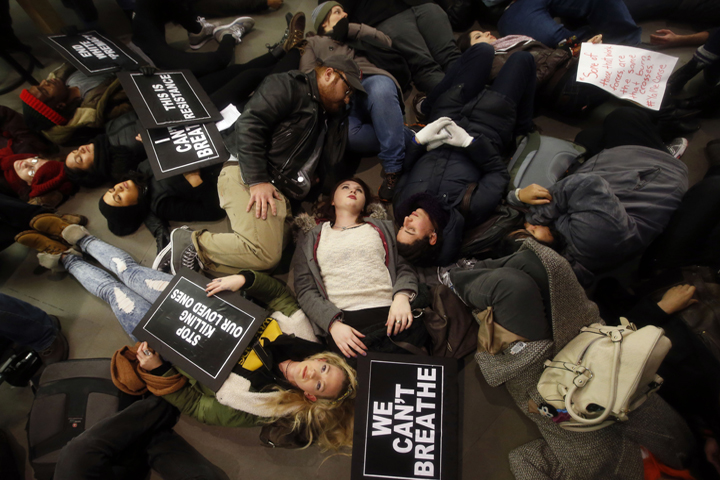Advertisement
What We Talk About When We Talk About Race In America
ResumeWith guest host John Donvan.
“White privilege,” Eric Garner, Michael Brown, and America’s complicated conversation on race.

Facts are facts. Reality is reality. Except, it seems, when Americans address each other matters of race and responsibility. That’s become obvious in the wake of protests that came out of Ferguson and Staten Island. One reality sees racism as still a living poison that leads to police killings and job discrimination, and a concept of “white privilege” that keeps African Americans at a constant disadvantage. In the other reality, white privilege is a fiction — and a bad excuse — for individual and even group failure. This hour, On Point: talking race: Where is that conversation, and where is it going?
-- John Donvan
Guests
Paul Butler, professor of law at Georgetown University. Author of "Let's Get Free: A Hip-Hop Theory of Justice."
John McWhorter, associate professor of linguistics and English at Columbia University. Contributor to TIME Magazine. Author of "What Language Is: And What It Isn't And What it Could Be," "The Power of Babel" and many more. (@johnhmcwhorter)
Heather Mac Donald, fellow at the Manhattan Institute and contributing editor at City Journal. Author of "Are Cops Racist? How the War Against the Police Harms Black Americans."
From The Reading List
The New Yorker: The Origins of “Privilege” — "The idea of 'privilege'—that some people benefit from unearned, and largely unacknowledged, advantages, even when those advantages aren’t discriminatory —has a pretty long history. In the nineteen-thirties, W. E. B. Du Bois wrote about the 'psychological wage' that enabled poor whites to feel superior to poor blacks; during the civil-rights era, activists talked about 'white-skin privilege.' But the concept really came into its own in the late eighties, when Peggy McIntosh, a women’s-studies scholar at Wellesley, started writing about it."
City Journal: The Microaggression Farce — "Colleges across the country behave no differently. As student claims of racial and gender mistreatment grow ever more unmoored from reality, campus grown-ups have abdicated their responsibility to cultivate an adult sense of perspective and common sense in their students. Instead, they are creating what tort law calls 'eggshell plaintiffs'—preternaturally fragile individuals injured by the slightest collisions with life. The consequences will affect us for years to come."
Salon: White privilege: An insidious virus that's eating America from within -- " The most insidious power of white privilege, the albatross effect that makes it so oppressive to white people themselves, is the way it renders itself invisible and clouds the collective mind. It’s like a virus that adapts in order to ensure its own survival and perpetuation, in this case by convincing its host it isn’t there. So we see polls suggesting that large percentages of white Americans believe that racism is not a significant factor in Ferguson or law enforcement in general, that cops are just doing their jobs, and that whatever bad things may have happened once upon a time in our beloved country, they’ve been locked away in the dusty cabinet of history and don’t matter anymore."
This program aired on December 9, 2014.